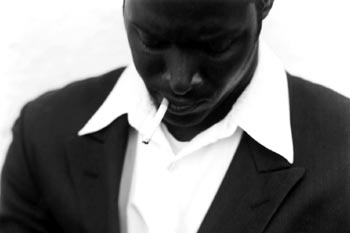'Can You Hear Me Out There?'
The S.F. Jazz Festival is long over. But jazz is still the best deal in town.
By Todd Dayton
I found jazz for the first time in a coffeeshop owned by a drummer named Ron on the corner of Martin Luther King and Russell in Portland, Oregon. I paid a buck for coffee and another for cover. Ron rattled the drums as people walked in off the street, sitting down at the piano or pulling a banged-up trumpet out of a case. There were kids from the high school band, learning something far more enduring than marching tunes. In a few hours on a rainy Sunday, they made it through a dozen standards, and a few tunes nobody had ever heard or will hear again. They may not have all been players, but they were all musicians.
Years later, jazz conjures up dark nights, not rainy afternoons and smoke-clouded bars, not fresh coffee. Blue neon is king in this world. And though the music has always been what's important, atmosphere can be everything. You just need to know the difference between having the atmosphere for jazz and having the jazz for atmosphere.
San Francisco doesn't have a Blue Note or Village Vanguard, where listeners lay down a $25 cover in addition to a two-drink minimum ($7.50 each) to hear a solid 80-minute set. That's not to say that the city lacks first-rate jazz. Far from it; San Francisco boasts (and attracts) some of the finest musicians, young and old, ever to play the music. And some of the least-inspired audiences.
Local jazz clubs.
Jazz, straight ahead, traditional, bop, old school, however you term it, is alive and well in San Francisco, drawing on a pool of immense talent and a sometime disinterested audience. The city's unique character shows in its jazz musicians, who play for dull crowds at times but never cease to shine. The scene is held together a lot of times by the players themselves. With only a few exclusive clubs in town, many jazz venues specialize in food or drink, and the music is just an extra--which means a lower payoff for musicians and an audience that hears jazz like white noise, comfortably drowning the outside world.
Marcus Shelby, a conductor and bassist who regularly appears at Bruno's, Club Deluxe and Enrico's, joined the local jazz scene less than two years ago and hasn't looked back. "I liked the renaissance of music and art going on in San Francisco," he says. "I wanted to collaborate with people on a lot of projects going on." Not to be limited to the descriptor of jazzman, Shelby has composed music for films, theater and ballets.
Shelby, who logged six years in L.A. with the group Black/Note, last year established Noir Records in San Francisco, featuring jazz, spoken word, classical, Afro-Brazilian and other nonmainstream music. His trio's recent release, Un Faux Pas! is currently out on Noir.
Shelby describes the scene here as very dedicated, with fewer artists trying to play for label executives rather than the audience. "Without that element, you have people really playing music because they love music. The club scene is more authentic--a young scene with people who are into jazz and can afford to go out and hear it. You don't make a lot of money, but it's great."
Another local jazz virtuoso says the Bay Area doesn't offer enough room for growth. Eight-string wizard Charlie Hunter departs for New York this month, spurred by the vastness of opportunity in the mecca of jazz. "It's just so practical," he says. "There are so many players there, it's just unbelievable. That's where all the players go. In every genre you can imagine, there's gonna be someone amazing there."
Hunter says that even after spending most of his life in Berkeley, the popularity of the Bay Area has made it nearly impossible to live here. "I just can't justify how expensive it is to live here for how little you get," he says. "It's easier to get an apartment in Manhattan."
At jazz venues in the city, a question frequently asked of audiences is "Can you hear me out there?" Maybe the bandleader just wants to know if the mic is turned up enough. But in a musical form inherently reliant on affirmation, and in a city where proper ambiance seems to require jazz rather than the other way around, the question really asks, "Is anyone listening?"
The reply to the question comes from one or two people in front, and it says, "I hear you" or "Keep on it." Maybe a few people clap. Someone drops a five in the jar. Then players smile and light into another song, and the jazz goes on.
Copyright © Metro Publishing Inc.

On the Scene and Not One False Move: Conductor/bassist Marcus Shelby delivers a world of sound to SF audiences.
![[line]](/metropolitan/gifs/line.gif)
![[line]](/metropolitan/gifs/line.gif)
From the December 1997 issue of the Metropolitan.
![[MetroActive Music]](/music/gifs/music468.gif)